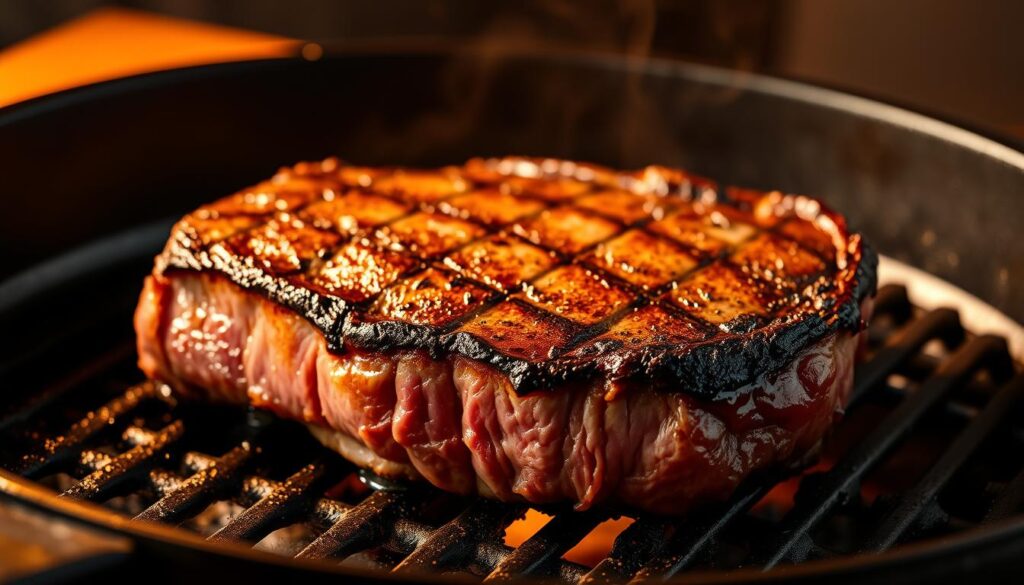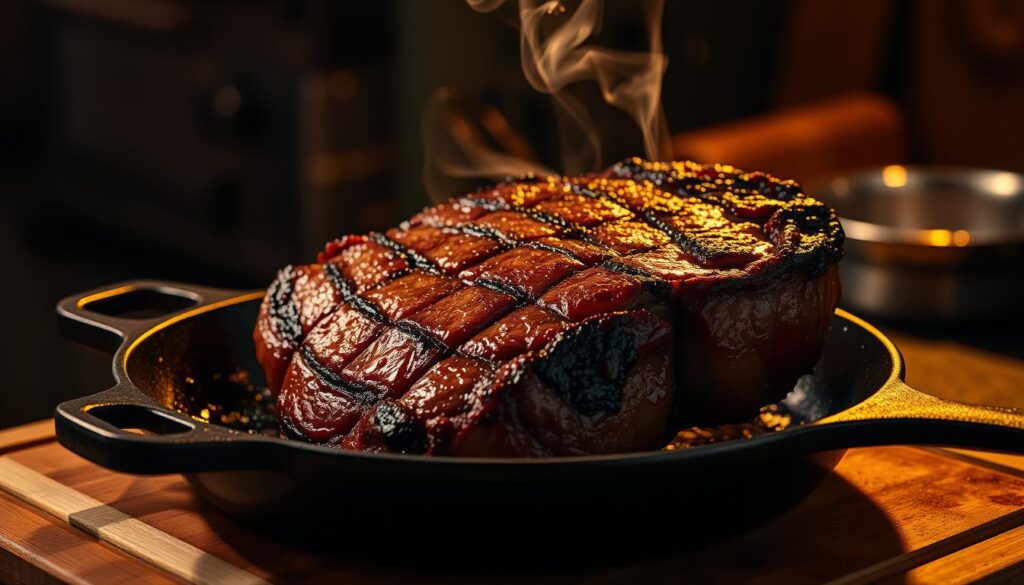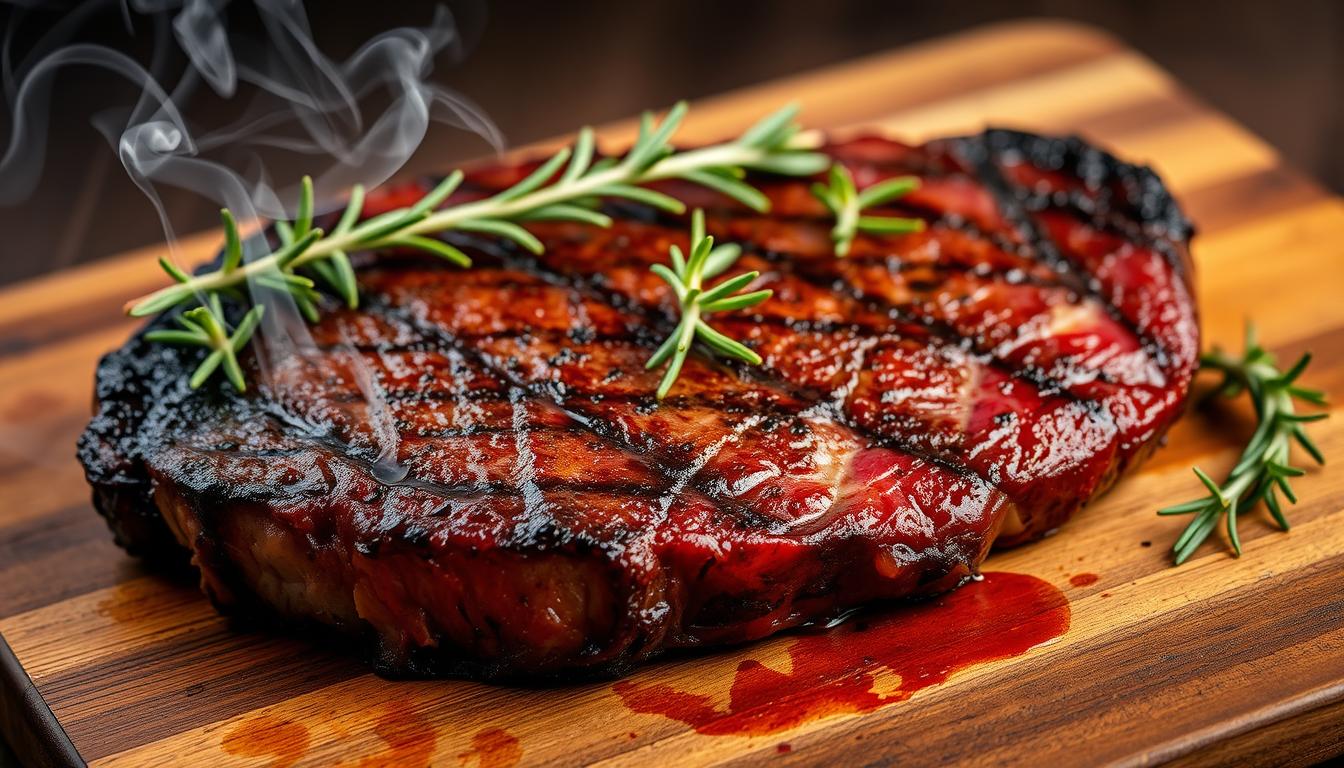Imagine biting into a perfectly smoked ribeye steak. Each bite is a mix of rich, smoky flavors that delight your taste buds. The beef smoking technique turns a great cut of meat into a masterpiece, making your backyard barbecue unforgettable.
Thank you for reading this post, don't forget to subscribe!Smoking a ribeye steak is more than just cooking—it’s an art that brings out amazing flavors in premium beef. Whether you love grilling on weekends or are serious about barbecue, learning to smoke a ribeye will open up a world of taste and texture.
This guide will teach you everything about making the most delicious smoked ribeye steaks in your backyard. You’ll learn how to pick the right cut and get that perfect smoky taste. You’ll become a true steak master.
Key Takeaways
- Smoking ribeye steaks enhances natural beef flavors
- Proper temperature control is crucial for perfect results
- USDA Choice cuts with good marbling work best
- Reverse sear method produces an exceptional texture
- Dry brining helps create a more flavorful steak
The Art of Smoking the Perfect Ribeye
Smoking a ribeye steak turns it into a true culinary masterpiece. Wood smoking meat needs precision, passion, and key techniques to enhance your BBQ. To make a restaurant-quality smoked ribeye, you must first master basic skills.
Professional smoker recipes require careful attention. The secret is in controlling temperature, picking the right wood, and using the right equipment.
Understanding Smoke Temperature and Time
To get a perfect ribeye, keep your smoker at 225 to 240 degrees Fahrenheit. This temperature is key for flavor and tenderness. Smoking time is usually 25 to 30 minutes, based on how done you like it.
- Ideal smoking temperature: 225-240°F
- Recommended smoking time: 25-30 minutes
- Target internal temperature for medium: 135°F
Choosing the Right Wood for Smoking
Wood choice greatly affects your steak’s taste. BBQ steak rubs pair well with different wood types:
- Cherry wood: Provides a mild, sweet flavor
- Hickory: Delivers a stronger, more robust taste
- Oak: Offers a balanced, medium-intensity smoke
Essential Equipment for Smoking Ribeye
Quality smoking equipment makes a big difference. You’ll need a reliable meat thermometer, a good smoker, and the right accessories for consistent results.
“The difference between a good and great smoked ribeye is often in the details of preparation and equipment.” – BBQ Master Chef
Learning these basic techniques will help you make delicious smoked ribeye. It will impress even the pickiest meat lovers.
Selecting and Preparing Your Ribeye Steak
Choosing the right ribeye steak is key to a delicious smoked dish. Look for premium cuts like bone-in, wagyu, or Angus ribeye steaks. These high-quality meats will elevate your smoking game.
Choose steaks with good marbling and a thickness of 1 to 1.5 inches. This ensures even cooking and keeps flavors in. Thicker cuts also help control the smoking process, giving you a perfect smoky taste and tender texture.
- Bone in ribeye steak offers extra flavor from the bone
- Wagyu ribeye steak provides superior marbling and richness
- Angus ribeye steak delivers consistent quality and tenderness
Preparation is as crucial as selection. Salt your steak well on both sides for about 60 minutes before smoking. This dry brining boosts the meat’s natural flavors and creates a tasty crust.
Pro tip: Let your ribeye rest at room temperature for about 30 minutes before smoking. This ensures even cooking and tenderness.
By carefully choosing and preparing your ribeye, you’re on your way to a fantastic smoked steak. It will surely impress any barbecue lover.
The Science Behind Dry Brining Your Steak
Dry brining changes the game for your smoked ribeye brine. It boosts the flavor and texture of your grilled steak recipes. This method is more than just seasoning; it’s a scientific way to make the perfect steak.
Learning about dry brining shows why chefs love it. When you sprinkle kosher salt on your steak, something amazing happens at the molecular level.
Salt Quantities and Timing
For the best results with your smoked ribeye brine, follow these guidelines:
- Use approximately 1/2 teaspoon of kosher salt per pound of meat
- Distribute salt evenly across the entire surface of the steak
- Allow 40-45 minutes for optimal moisture reabsorption
Temperature and Storage During Brining
Proper storage is key for dry brining. Put your salted steak on a wire rack in the fridge, uncovered. This lets air circulate and creates a tasty crust for your grilled steak recipes.
Benefits of Dry Brining
Dry brining brings many benefits to your smoked ribeye:
- Enhanced moisture retention – Salt keeps the meat juicy
- Improved flavor penetration
- Development of a superior crust through the Maillard reaction
- Increased tenderness of the meat
Pro tip: Always use kosher salt for the most effective dry brining technique.
Mastering Smoked Ribeye Steak Techniques

Getting your grilled ribeye steak just right takes skill and knowledge of smoking techniques. Learning to grill a ribeye on a gas grill means mastering temperature control.
Begin by setting up your smoker with these steps:
- Preheat the smoker to 225°F-250°F
- Select hardwood chips for enhanced flavor
- Place a digital meat thermometer in the thickest part of the steak
Pro tip: Ribeye steaks are renowned for their exceptional marbling, which ensures rich flavor during the smoking process.
“The secret to a perfect smoked ribeye is patience and precise temperature monitoring.” – Professional Grill Master
Keep a close eye on your steak’s internal temperature. For a medium-rare finish, remove the steak when it reaches 110-115°F. This ensures it cooks to the perfect 135°F for doneness.
Key smoking techniques include:
- Maintain consistent smoker temperature
- Use a quality digital thermometer
- Allow adequate resting time after cooking
Smoking a ribeye is an art. With practice and focus, your grilling skills will improve greatly.
Temperature Guide for Perfect Doneness
Getting the perfect temperature is key to a tasty ribeye steak. It’s all about the internal temperature. This ensures your steak is cooked just right.
Internal Temperature Checkpoints
The way you cook your ribeye steak affects its nutrition. Each level of doneness brings its taste and nutrients:
- Rare: 120-130°F (target internal temperature)
- Medium Rare: 130-135°F (most recommended)
- Medium: 135-145°F
- Medium Well: 145-155°F
- Well Done: 155°F and above
Resting Time Recommendations
Let your ribeye rest for 10 minutes after smoking. This step is vital for keeping the steak juicy and nutritious. The steak will warm up by 5-10°F during this time.
Using Meat Thermometers Effectively
For accurate tracking, use a good meat thermometer. Stick the probe into the thickest part, avoiding fat or bone. Take the steak out a bit before it hits your target temperature.
Pro tip: A 1-inch thick ribeye needs 1.5 to 2 hours of smoking at 225°F. This ensures it’s cooked perfectly and keeps its nutrients.
The Reverse Sear Method for Enhanced Flavor

Learning the reverse sear method can make your grilling ribeye steak amazing. This technique lets you cook like a pro at home. You’ll get a steak with a great crust and a tender inside.
The reverse sear method is a two-step process. It ensures even heat and brings out the best flavors. Begin by cooking your steak at 225°F. This helps it cook evenly.
Key Steps for Reverse Sear Ribeye
- Select a thick ribeye steak (1.5-2 inches)
- Season generously with kosher salt and pepper
- Cook in a low-temperature oven until internal temperature reaches the desired level
- Rest the steak for 6-10 minutes
- Sear on high heat for 45-60 seconds per side
Knowing the right internal temperature is key for the perfect doneness:
| Doneness | Remove from Oven | Final Temperature |
|---|---|---|
| Rare | 105°F | 120°F |
| Medium-Rare | 115°F | 130°F |
| Medium | 125°F | 140°F |
For a great crust, use a cast-iron skillet or grill at 500-600°F. Avocado oil is best because it can handle high heat well.
“The reverse sear method isn’t just a cooking technique—it’s a game-changer for steak enthusiasts.” – Professional Chef
By sticking to these steps, you’ll make your reverse sear ribeye truly special. You’ll impress everyone with your cooking skills.
Essential Seasonings and Rubs for Ribeye
Turning your Delmonico ribeye steak into a masterpiece starts with the right seasoning. BBQ steak rubs are key to making an ordinary steak into a work of art. Knowing how to mix and apply spices is crucial for great results.
Making a classic steak rub is about finding the right balance of flavors. Here’s a seasoning mix that will elevate your ribeye:
| Ingredient | Quantity |
|---|---|
| Kosher Salt | 2 Tablespoons |
| Black Pepper | 2 Tablespoons |
| Garlic Powder | 2 Tablespoons |
| Smoked Paprika | 1 Tablespoon |
| Onion Powder | 1 Tablespoon |
Creating the Perfect Steak Rub
Your homemade BBQ steak rubs should boost the meat’s natural taste. Here are some tips for mixing your seasonings:
- Grind whole spices fresh for maximum flavor intensity
- Mix ingredients thoroughly to ensure even distribution
- Store in an airtight container for up to 6 months
When and How to Season
For the best results, rub your Delmonico ribeye steak generously 30-60 minutes before cooking. This lets the salt soak into the meat, creating a flavorful crust. Thicker cuts (1.5-2 inches) need more seasoning to ensure every bite is full of flavor.
Pro tip: Don’t be afraid to experiment with different spice combinations to find your signature rub!
Tips for Achieving Restaurant-Quality Results
Learning to grill a ribeye steak like a pro starts with precision. Choose a high-quality cut, like USDA Prime or Wagyu beef. Make sure the steak is 1 to 1.5 inches thick for the best cooking and texture.
Mastering temperature control is crucial. Use a meat thermometer to check the internal temperature. For medium-rare, aim for 135°F. Let the steak rest for 10 minutes after cooking. This step ensures the steak stays tender and flavorful, just like in restaurants.
Professional chefs suggest using cast iron or stainless steel pans for even heat. When searing, keep the temperature between 450°F to 500°F. Flip the steak only once to keep it tender. Season with a 2:1 salt-to-pepper ratio just before cooking.
The last step is presentation. Slice the ribeye against the grain for tenderness. Serve it right away after resting to keep the flavor and texture perfect. With these tips, your home-cooked ribeye will impress anyone.
FAQ
What is the ideal temperature for smoking a ribeye steak?
How long does it take to smoke a ribeye steak?
What are the best wood types for smoking ribeye?
How do I know when my smoked ribeye is done?
What is dry brining, and why is it important?
What is the reverse sear method?
What type of ribeye is best for smoking?
How long should I let my smoked ribeye rest?
What are the nutritional highlights of a ribeye steak?
What seasonings work best for smoked ribeye?
Source Links
- Reverse-Seared Smoked (or Grilled) Ribeye Steak — Randy’s Favorites – https://www.randysfavorites.com/recipes-1/2017/1/21/smoked-ribeye
- Smoked Ribeye Steaksrn – https://lenaskitchenblog.com/smoked-ribeye-steaks/
- Smoked Ribeye Steak – https://www.greatgrubdelicioustreats.com/smoked-ribeye-steak/
- How to Smoke The Perfect Cowboy Ribeye – https://www.bradleysmoker.com/blogs/articles-smoking-guide/how-to-smoke-the-perfect-cowboy-ribeye?srsltid=AfmBOopoOZSAgLpA67Sa_g3gTvr3_e1x5gS8C7T92GrKmPGcNqmsdPCL
- Mastering the Art of Grilling the Perfect Steak with BBQ – – https://butcherbbq.com/blogs/news/mastering-the-art-of-grilling-the-perfect-steak-with-butcher-bbq?srsltid=AfmBOorFmLZL0Fp6hUgGQ7PS09QHYnePmzuKdd7i0VA8QJxAEucjYeg_
- Reverse Seared Smoked Ribeyes – https://hildaskitchenblog.com/recipe/reverse-seared-smoked-ribeyes/
- How to Cook a Ribeye On The Stove: Everything You to Know – https://rosebudsteak.com/how-to-cook-ribeye-on-stove/
- Perfect Ribeye Steak – https://overthefirecooking.com/perfect-ribeye-steak/
- Dry-Brining Is the Best Way to Brine Meat, Poultry, and More – https://www.seriouseats.com/how-to-dry-brine
- The science behind dry brining and how it makes your steak better – https://www.crowdcow.com/blog/the-science-behind-dry-brining-and-how-it-makes-your-steak-better?srsltid=AfmBOookbUXPR4PnJ8rFsUbVxn_eXzgLQlWT_r1tF8N8XOpjMys6Kpbs
- How to Season Your Steak | Steak University – https://www.mychicagosteak.com/steak-university/how-to-season-your-steak?srsltid=AfmBOopPfPqXa-8x3OQwsq0M7XwYo0d1yPElEB57jrCIQvQh0FWklx8g
- The Ultimate Guide to Steaking: Tips and Techniques for Perfect Steaks Every Time – https://meatking.hk/blogs/cooking-tips/ultimate-guide-to-steaking?srsltid=AfmBOoraYAJ5GzQsWNsbm2IekGZl3wsnvVAN0kRXbuwAL6M-Mbu_zRaN
- How to Reverse Sear a Steak in a Smoker – Steak Obsession – https://steakobsession.com/how-to-reverse-sear-a-steak-in-a-smoker/
- How to Reverse Sear Smoked Ribeye Steaks – Learn to Smoke Meat with Jeff Phillips – https://www.smoking-meat.com/how-to-reverse-sear-smoked-ribeye-steaks
- The BEST Smoked Ribeye- Easy, Tender, and Juicy + Video – https://www.atablefullofjoy.com/smoked-ribeye/
- How To Reverse Sear Steak – https://thegourmetbonvivant.com/reverse-sear-steak/
- How to Reverse Sear a Steak – Yoder Smokers – https://www.yodersmokers.com/2023/05/how-to-reverse-sear-a-steak/
- Mastering the Art of Reverse Searing: A Guide to Perfectly Cooked Steaks 🔥 🥩 — HappiHuman by Kelly Aiello Nutrition Coach & Brain Health – https://happihuman.com/blog/reverse-sear-steak
- The BEST Steak Seasoning – Hey Grill, Hey – https://heygrillhey.com/steak-seasoning/
- Seasoning for Successful Steak – https://cusocuts.com/blogs/grilling-tips/seasoning-for-successful-steak?srsltid=AfmBOooBg1c28ZhrOMRNoZ16z74LxEZKzlhWm2VtJ6TujtZtDSIIAIuH
- 13 Tips For Cooking Restaurant-Quality Steak At Home, From A Pro Chef – Tasting Table – https://www.tastingtable.com/1660727/tips-restaurant-quality-steak/
- Texas Steak Cooking Guide: Steakhouse Quality at Home | Expert Tips – https://www.lockhartsmokesignals.com/bbq-at-home/the-big-texas-guide-to-cooking-steakhouse-quality-steak/
- Great advice for cooking restaurant-quality steak every time – https://www.lovefood.com/gallerylist/65647/great-advice-for-cooking-restaurantquality-steak-every-time


